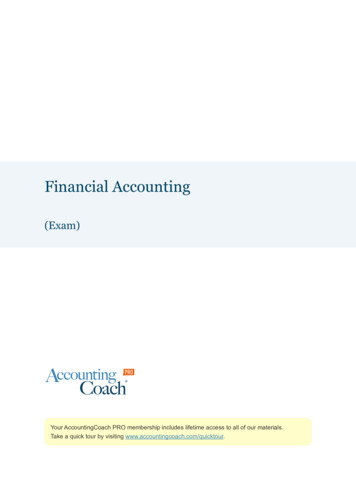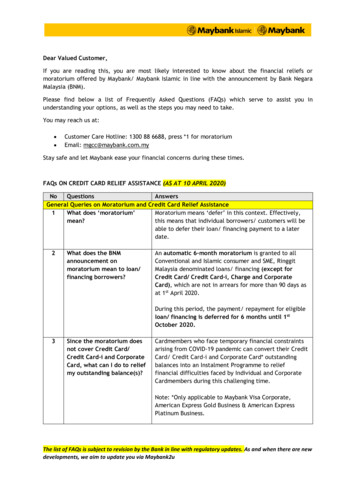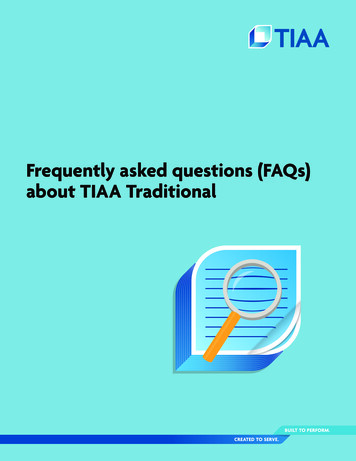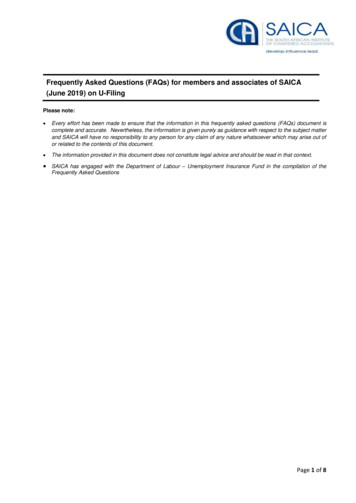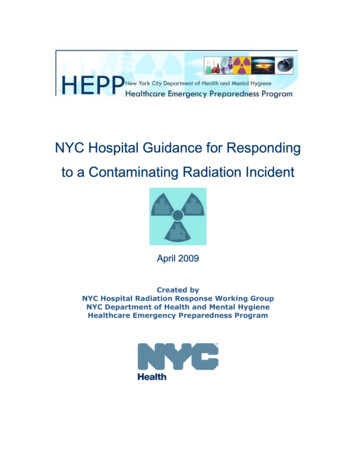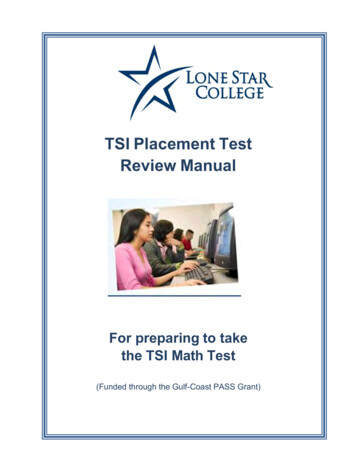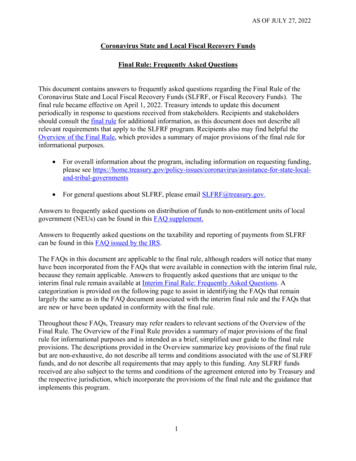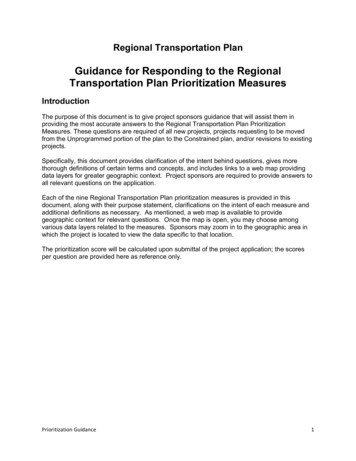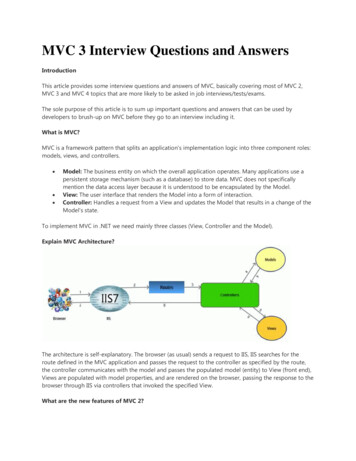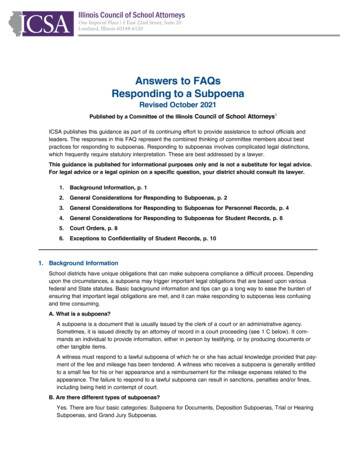
Transcription
Illinois Council of School AttorneysAnswers to FAQsResponding to a SubpoenaRevised October 2021Published by a Committee of the Illinois Council of School Attorneys1ICSA publishes this guidance as part of its continuing effort to provide assistance to school officials andleaders. The responses in this FAQ represent the combined thinking of committee members about bestpractices for responding to subpoenas. Responding to subpoenas involves complicated legal distinctions,which frequently require statutory interpretation. These are best addressed by a lawyer.This guidance is published for informational purposes only and is not a substitute for legal advice.For legal advice or a legal opinion on a specific question, your district should consult its lawyer.1.Background Information, p. 12.General Considerations for Responding to Subpoenas, p. 23.General Considerations for Responding to Subpoenas for Personnel Records, p. 44.General Considerations for Responding to Subpoenas for Student Records, p. 65.Court Orders, p. 86.Exceptions to Confidentiality of Student Records, p. 101. Background InformationSchool districts have unique obligations that can make subpoena compliance a difficult process. Dependingupon the circumstances, a subpoena may trigger important legal obligations that are based upon variousfederal and State statutes. Basic background information and tips can go a long way to ease the burden ofensuring that important legal obligations are met, and it can make responding to subpoenas less confusingand time consuming.A. What is a subpoena?A subpoena is a document that is usually issued by the clerk of a court or an administrative agency.Sometimes, it is issued directly by an attorney of record in a court proceeding (see 1 C below). It commands an individual to provide information, either in person by testifying, or by producing documents orother tangible items.A witness must respond to a lawful subpoena of which he or she has actual knowledge provided that payment of the fee and mileage has been tendered. A witness who receives a subpoena is generally entitledto a small fee for his or her appearance and a reimbursement for the mileage expenses related to theappearance. The failure to respond to a lawful subpoena can result in sanctions, penalties and/or fines,including being held in contempt of court.B. Are there different types of subpoenas?Yes. There are four basic categories: Subpoena for Documents, Deposition Subpoenas, Trial or HearingSubpoenas, and Grand Jury Subpoenas.
(1) Subpoena for DocumentsA subpoena requiring the production of documents is generally referred to as a subpoena ducestecum. It is usually issued at the request of a party in a court or administrative proceeding. It compels the recipient of the subpoena to produce specific documents, materials, or other tangible itemsrelevant to the facts at issue in a pending action.Many times, the party serving the subpoena may permit the witness to produce the requested documents rather than testifying in-person.2Tip: If the party serving the subpoena allows your districtto produce documents instead of testifying, secure writtenconfirmation that no in-person testimony will be required.(2) Deposition SubpoenaA deposition is used in a legal proceeding to gather information that may be relevant to a party’s positions in a case by allowing the parties or their attorney to ask questions of a witness. A deposition subpoena requires the person to whom the subpoena is directed to appear as a witness at a certain location and time and provide sworn testimony or to produce certain documents or other tangible items.(3) Trial or Hearing SubpoenaSimilar to a deposition subpoena, a subpoena to appear at a trial or hearing requires a person toappear as a witness.(4) Grand Jury SubpoenaGrand juries use subpoenas to gather the evidence they need to use in deciding whether crimesmay have been committed. Both State and federal grand juries have the power to subpoena documents and physical evidence (e.g., books, videotapes, guns, etc.) and they may subpoena witnesses to testify before them.Sometimes a grand jury subpoena includes instructions not to discuss the subpoena outside of theindividuals needed to comply with its request(s). Not complying with these instructions can subjectindividuals to civil and sometimes criminal contempt of court, depending upon the rules of the courtfor which the grand jury is serving.C. Who has the power to issue subpoenas?Generally, subpoenas are issued by the clerk of a court or administrative bodies. An attorney admittedto practice in Illinois may also issue subpoenas in a pending action. Subpoenas are often issued onpre-printed blank forms, and the parties in the court or administrative proceeding (or their attorneys) areresponsible for determining its terms (i.e., date, time and location), as well as to whom the subpoenawill be issued. Some examples of common types of subpoenas include those issued in (a) domestic civillawsuits (e.g., divorce or child custody proceedings), (b) personal injury or medical malpractice civil lawsuits, (c) juvenile criminal proceedings, (d) Ill. Department of Children and Family Services proceedings,and (e) Ill. State Board of Education certificate revocation proceedings.2. General Considerations for Responding to SubpoenasA. I was served with subpoena, what should I do?(1) D o not ignore it! Courts and agencies expect compliance with subpoenas to the greatest extent possiblewithin federal and State statutory obligations and limitations. Failure to comply can result in sanctionsagainst the person subpoenaed or even the school district (see 1 A above). A response will depend uponmany factors, including, but not limited to: (a) who or what entity or individual issued the subpoena, (b) thetype of subpoena (see 1 B (1)-(4) above), (c) whether the matter is in Illinois or federal court, and (d) whatthe subpoena requests.2
(2) E nsure that all district staff know whom to contact in the district office upon receipt of a subpoena, andthat staff submit a copy of the subpoena to that person. Often times, subpoenas are sent directly to astaff member, and it is important that all subpoenas are routed to the district office so the district can follow a consistent practice when responding to them.(3) U nderstand what the subpoena requests and requires your district and/or its staff to do. Call the boardattorney and promptly provide him or her with a copy of the subpoena and any additional documentsreceived. If you do not have authority to contact the board attorney, follow your district’s chain of command to reach a person who does have authority to contact the board attorney. The board attorney willassess the subpoena to determine what information or records are sought and whether the request triggers any legal obligations under federal or State laws.(4) R espond to the subpoena as the board attorney advises. Some subpoenas will request records that trigger legal obligations (e.g., personnel records, student records, mental health records, etc.). However, theboard attorney will help your district honor the subpoena in a way that is consistent with the school’s legalobligations under applicable federal and State law.Tip: A school district and its staff rarely have a legal stake in theissues or outcomes of the matters requiring compliance with a subpoena.B. Is the subpoena even valid?Ensuring that the subpoena is in fact valid before complying with its terms is important. The board attorney can help you determine whether the subpoena is valid. Questions about validity occur frequentlybecause subpoenas do not always come directly from a court or administrative body. Many individualattorneys now serve subpoenas.Generally, a valid subpoena will:(1) S tate the name of the court or administrative body that issued it.(2) State the caption/title of the proceeding along with the case number.(3) P rovide the witness with the information necessary to allow an adequate response. This information includes the date, time and location when the appearance is required and/or documents must be provided. If the subpoena requires the witness to bring certain documents,these documents should be sufficiently described so that the witness knows what to bring.(4) B e served on the witness. A subpoena can be served personally by causing a qualified process server to deliver a copy of the subpoena to the witness. Illinois court rules also allow a subpoena to be mailed to a witness, usually through return-receipt certified or registered mail.3(5) P rovide a witness fee for the appearance. Provide reimbursement to the witness for themileage necessary to travel to the location of the deposition, trial or hearing.Tip: If a subpoena is issued by a court outside of Illinois, consult theboard attorney about whether or not the school district must respond to it.C. How much time do I have to respond to the subpoena?The answer depends upon whether the request is in Illinois state court or federal court. Illinois state courtrules require service at least seven (7) days before the date on which the appearance is required for adeposition, hearing or trial.4 Contrast this to federal court rules, which require service to simply allow “reasonable time for compliance.”5 When a subpoena compels an appearance at a deposition or the production of documents, the deadline to respond can generally be negotiated.3
D. Do I really have to travel? How far?Travel also depends upon many factors similar to the ones discussed above in 2 A (1). Following aresome of the more common court rules that school districts may encounter:(1) I llinois court rules for depositions:6 If the witness is not a party to the lawsuit, then the deposition mustoccur in the county where the subpoenaed person resides. A legal entity (e.g., a school board or schooldistrict) also enjoys this same right to the deposition occurring in the county where it transacts business. Ifthe witness is a party to the lawsuit, then the deposition must occur in the same county where the lawsuitis pending, but the court has the discretion to order the deposition to occur elsewhere in the state.(2) I llinois court rules for trials or hearings:7 A witness may be required to travel beyond the county where heor she resides. However, the party issuing the subpoena must pay the witness a fee for the appearanceand reimburse the witness for his or her mileage necessary to travel to the location of the trial or hearing.8(3) F ederal court rules for depositions, hearings, trials or production of documents or tangible items:9 A witness is required to travel if he or she can be served (a) within the court’s jurisdiction, (b) within 100 milesof the location where a deposition, document production, hearing or trial is scheduled to occur, or (c) anywhere within the State. If the witness is not a party to the lawsuit and the subpoena requires him or herto incur substantial expense or travel over 100 miles to attend a trial, the court has the power to quash ormodify the subpoena. To do this, the district will need assistance from the board attorney.E. W hat can our school district do to avoid panic about responding to a subpoena, ensure sufficienttime to assess it, plan for staff absences, and provide the required notices to those affected by it?Discuss with the board attorney an efficient plan of action that works in your school district. Considerincluding this plan during annual training sessions with school personnel, so that they are aware of whatto do if they receive a subpoena (see also 2 A (2)).Other avenues that may work to ensure smooth responses include tactics that attorneys frequently use,such as prior established relationships from the school district’s regular contact or dealings with local family courts, juvenile courts or other state or local agencies. Many attorneys also provide their clients template form letters that the attorney or school officials can modify.3. General Considerations when Responding to Subpoenas for Personnel RecordsSubpoenas for personnel records often require school districts to balance between the following competingobligations: compliance with the directives of the subpoena and the standing requirements imposed by applicable personnel records laws. Common laws that require this balance are the Ill. Freedom of InformationAct (FOIA), the Ill. Personnel Record Review Act (PRRA), and 105 ILCS 5/24A-7.1 (prohibits the release ofteacher, principal, and superintendent performance evaluations).A. What are the competing obligations between FOIA and subpoenas that request personnel records?Sometimes, a subpoena requests information that would be exempt from disclosure if the same information was the subject of a FOIA request. Because of this, school officials can mistakenly believe that theschool district need not produce the records that the subpoena requests. Because a subpoena is manageddifferently than a FOIA request, the board attorney will need to help your district balance these competinginterests (see 2 A (2) and (3)). Oftentimes a motion can be filed seeking to quash (reject or void) the subpoena based upon the same public policy concerns outlined in FOIA. When these motions are filed, manyattorneys argue that releasing the requested information from personnel records would constitute a clearlyunwarranted invasion of privacy or amount to a release of private information as defined by FOIA.10Tip: Remember that a subpoena and a FOIA request are managed differently.4
B. What are the competing obligations between PRRA and subpoenas requesting personnel records?For more detailed information about the PRRA, see Employee Records; Understanding theImplementation of the Ill. Personnel Records Review Act, available at: www.iasb.com/IASB/media/SchoolLaw/2021/Personnel Records Review Act.pdf. The primary purpose of the PRRA11 was to establish anemployee’s right to review his or her personnel records. It provides a number of remedies when violationsoccur and also:(1) Describes certain kinds of information that may not be maintained in an employee’s personnel records;(2) P rovides that information that is not in the employee’s record may not be used against the employee in ajudicial or administrative hearing (such as for dismissal);(3) R equires the school district to allow an employee to inspect and copy the contents of his or her personnelrecords within seven working days of a written request;(4) E stablishes a procedure enabling the employee to correct, remove or explain information contained in therecord;(5) Exempts certain types of documents from employee inspection;(6) Prohibits divulging certain types of information from the employee’s record to third parties; and(7) Provides procedures for divulging certain other types of information.Number (6) generally requires school districts to balance between the competing obligations of compliance with the directives of the subpoena and the standing requirements imposed by the PRRA. Similar tothe discussion above in 3 A about FOIA, the board attorney will need to assist your district with balancingthese competing interests (see 2 A (2) and (3)). Sometimes the employee whose personnel records havebeen subpoenaed will need to hire his or her own attorney.Sometimes the school district may be ordered to comply with the subpoena despite the PRRA. If thisoccurs, following the orders that are issued will likely prevent a finding that your district willfully violated the PRRA. When a district is ordered to comply despite the PRRA, the employee whose personnelrecords have been subpoenaed may need or wish to hire his or her own attorney to file an action in theappropriate circuit court to try and compel compliance with the PRRA’s requirements.Tip: Remember that the rights and remedies under this Act that would prevent full compliance with a subpoena belong to the eligible employee not the district. In all likelihood, theschool district or employee will have to comply with the subpoena in one form or another.C. W hat are some considerations for a school district if it receives a subpoena for records that, by law,it cannot release, e.g., 105 ILCS 5/24A-7.1 (prohibits the release of teacher, principal, and superintendent performance evaluations)?Similar to the discussions above, the board attorney will need to assist your district with balancing compliance with the directives of the subpoena and the requirements of the law. While there is possibility thata school district could be ordered to comply with the subpoena despite the law, following orders that areissued will likely prevent a finding that your district willfully violated any law(s). If your district is ordered tocomply with a subpoena despite a law that prohibits the subpoenaed records’ release, the involved individual whose records have been subpoenaed may need or wish to hire his or her own attorney to file anaction in the appropriate tribunal to try and compel compliance with the law prohibiting release.D. What must the school district do before it provides subpoenaed personnel records?(1) U nderstand what the subpoena requests (e.g., documents, testimony, both, etc.) and requires the witness to do (see 2 A (2) above). Manage compliance with the directives of the subpoena, the standingrequirements imposed by any applicable laws, and the directions of any court or agency orders.Tip: Follow all court or arbitrator’s orders.5
(2) C omply with the PRRA12 If no court or arbitrator in a legal action or arbitration has ordered the release ofthe records, the school district should follow the requirements of the Act and consult the board attorneywith questions.The Act does not allow the school district to release any disciplinary reports, letters of reprimand, orevidence of other disciplinary action that are more than four years old. (However, if the school district isordered to do so by a judge in a legal action or arbitration, then the district and/or witness must follow thatorder despite the Act (see 3 C (1) above).Note: this prohibition does not apply to information related to an incident or an attempted incident of sexual abuse or severe physical abuse.The PRRA allows the school district to release disciplinary reports that are less than four years old whenit sends written notice to the employee by first-class mail on or before the day when the information isdisclosed.Tip: While the Act now permits this required notice by electronic mail for FOIA requeststhat seek the same information, first-class mail is still required for a subpoena.13Of course, there are a few exceptions to this written notice requirement. The school district may releaserecords of disciplinary actions that are less than four years old without written notice if:(a) an employee has signed an employment application with another employer waiving the writtennotice requirement; orTip: Many school districts incorporate waivers of notice intheir employment applications, making it as easy as possible forprevious employers to share relevant information about job applicants.(b) the disclosure is ordered to a party in a legal action or arbitration; or(c) t he disclosure is requested by a government agency (e.g., the Ill. Department of Human Rightsand the Equal Employment Opportunity Commission, etc.) involved in a claim or a complaint by anemployee or a criminal investigation.(3) E xamine any public policy implications of FOIA.14 The board attorney may have filed a motion to quash ormodify the subpoena. Discuss with the board attorney whether to redact any information that FOIA woulddefine as a clearly unwarranted invasion of privacy, private information, or personal information as definedby FOIA. (See the discussion in 3 A above.)4. General Considerations for Responding to Subpoenas for Student Records and InformationSubpoenas for student records also require school districts to balance between competing obligations. Thestudent records laws that most frequently require this balance are the Family Education Rights and PrivacyAct (FERPA)15 and Ill. School Student Records Act (ISSRA).16 Other laws also provide confidentiality andprivilege protection to student information, including the Ill. Mental Health and Developmental DisabilitiesConfidentiality Act (IMHDDCA)17 (provides several age breaks for when the child is in control of who can seehis or her records), and the Clinical Social Work and Social Work Practice Act.18A. W hat are the competing obligations between student records, privilege and confidentiality laws andsubpoenas that request student information that these laws protect?Competing obligations generally arise when subpoenas request information about a student that is: (a)non-directory information, (b) directory information but the student’s parent or the student has requested thatthe school district not release it, and (c) a statute specifically prohibits the release of the requested studentrecords.6
First, note that a subpoena that requests a student’s directory information 19 does not usually presentany competing obligations under FERPA or ISSRA. Directory information may be released, unless thestudent’s parent or the student has requested that the school district not release it (see 4B below). Inaddition, students sometimes specifically request that their directory information not be released pursuantto subpoenas. These specific requests also create competing obligations for a school district to manage:compliance with the subpoena and compliance with the student’s directive not to release directory information pursuant to a subpoena. The IMHDDCA prohibits compliance with a subpoena for records or communications that are covered under it, unless the subpoena is served with a “written order authorizing theissuance of the subpoena or the disclosure of the records.20Many individuals and entities serving subpoenas are not familiar with the various competing obligationsthat school officials face when their districts are served with a subpoena for student records or information.Because the school district cannot ignore these subpoenas, it must: (a) either come to an agreement withthe requester about compliance with the applicable laws, or (b) seek to have the subpoena quashed by thecourt or administrative agency with jurisdiction over the matter in which the subpoena was issued.B. Our school district received a subpoena for a student’s records. What should we do?It depends upon what type of student records the subpoena is seeking and whether the school districthas informed its community that directory information may be released in response to a subpoena. Yourdistrict will need to contact the board attorney for assistance. Here are four common scenarios that you’lllikely contact the board attorney about:(1) Subpoena seeking only directory information. If the student has no specific requests not to release it,then your district likely can respond to the subpoena after: (a) notifying the affected parents and/or students in writing, and (b) including the date of notification, parents’ names, name of student, directoryinformation to be released, and the scheduled date of release.(2) Subpoenas seeking directory information that a parent or student has requested not be released.21Before releasing any of the requested information, consult with the board attorney. Your district will likelyneed to inform the party that issued the subpoena of (1) the requirements of the ISSRA22 and (2) thatin addition to ISSRA rights, students of all ages may also request that their directory information not bereleased pursuant to subpoenas. After informing the party that issued the subpoena of these competing interests, the party can then decide whether to seek a court order for release of the information.Depending upon the facts, some school board attorneys may help your district by filing a motion to (1)quash the subpoena, or (2) ask for a protective order before the appropriate court or tribunal, citing limitations under ISSRA or other laws. Sometimes the student’s parents may also hire an attorney to filesimilar motions to enforce the student’s or his or her parent’s requests.Tip: Maintain focus on compliance with the subpoena;objections to a valid subpoena for a student’s informationgenerally belong to the student or his or her parents.(3) S ubpoenas seeking non-directory student record information. Your district should not release the information without forwarding it to the board attorney because ISSRA states that student records are confidential, subject to some exceptions. A subpoena is not one of the listed exceptions. Some of the morecommon exceptions listed in ISSRA include:23(a) Written authorization from the parent (or student, when the rights have transferred to the student) forthe release of the records to a third party.(b) Court orders. A court order is an order signed by a judge; a subpoena for records that is not signedby a judge is not a court order (but see the discussion in number 5, Court Orders, below). If a courtorder authorizes the release of student records, follow the additional steps below in the answer toquestion 5.B. For more discussion, about court orders, see number 5, Court Orders, below.7
(c) Any person as specifically required by State or federal law.24 Certain state and federal laws allowhearing officers, arbitrators, or agents of governmental entities (e.g., the Ill. State Board of Education,Ill. Department of Human Rights, or Office for Civil Rights) to issue subpoenas for records. Manyattorneys interpret this provision to mean that the State or federal law should specifically outlinewhich individual or agency is entitled to receive a student’s records. School officials should consultthe board attorney about this issue. Note: Do not always assume that your district is specificallyrequired to release the requested records to an individual because that individual has authority toissue a subpoena.(d) S ubpoenas seeking directory information, but the district has not informed its community that directoryinformation may be released in response to a subpoena. Examine your school district’s definition ofdirectory information within your district’s school board policies, administrative procedures and studenthandbooks. If they do not discuss the fact that your school district may release directory informationin response to a subpoena, releasing the directory information may present more challenges. If yourschool district does not indicate that directory information may be released in response to a valid subpoena, consult the board attorney before responding to the subpoena.C. O ur school district received a subpoena for a student’s mental health and/or developmentaldisabilities records. What should we do?Do not release these records. Immediately consult the board attorney for guidance. The IMHDDCAoutlines extensive methods for handling these records. It states that “[n]o person shall comply with asubpoena for records or communications under the IMHDDCA unless the subpoena is accompanied bya written order authorizing the issuance of the subpoena or the disclosure of the records. For more discussion about written orders and court orders, see number 5, Court Orders below. Written consent of anindividual who is entitled to inspect and copy a service recipient’s record would also allow release; however a valid written consent must contain several statutory elements.D. May our school district release biometric information pursuant to a subpoena?No. A school district may not release biometric information about a student unless the disclosure isrequired by a court order.25 Your district should follow the steps for 4 B(2) above by informing therequestor of the requirements of ISSRA.E. M ay our school district release information communicated by a student, parent or guardian to a lawenforcement professional working in the school?ISSRA prohibits the disclosure of this without a court order.265. Court OrdersA. I had an attorney call me and say that a subpoena is the same as a court order and that I mustcomply. Is that correct?No. A court order is a document signed by a judge. Subpoenas are typically signed by a court clerk,administrative agency official, or attorney of record in a legal proceeding before a court. Some attorneyshold the opinion that subpoenas are not court orders, even if they are on an official court form issuedunder the “clerk of the court,” unless they are signed by a judge. Other attorneys hold the opinionthat subpoenas are court orders because they are issued under the “clerk of the court.” Sometimes astatute that governs release of the requested record defines court order. For example, IMHDDCA andISSRA define “written court order” as a written order issued by a judge, authorizing the disclosure of therecords or the issuance of the subpoena. Therefore, and depending upon the record requested and thestatute that governs the record’s release (e.g., ISSRA, IMHDDCA, etc.), a subpoena alone may not bethe same as a court order and the subpoena may need to be accompanied by a separate court order.Tip: Remember to look at the statute thatgoverns the requested record’s release.8
B. I received a court order to release student records. Are there any additional requirements other thansending out the records?Yes. Under Section 6(a)(5) of ISSRA, your district may release records pursuant to a court order provided your district gives the parent(s) prompt written notice of: (1) the order’s terms, (2) the nature andsubstance of the information proposed to be released pursuant to the order, and (3) his or her rightto have an opportunity to inspect and challenge the student record’s contents pursuant to Section 7 ofISSRA. Note: Oftentimes school districts receive subpoenas for student records from an attorney (or arecord service agency) in a medical malpractice case, a custody battle, or juve
sonable time for compliance."5 When a subpoena compels an appearance at a deposition or the produc-tion of documents, the deadline to respond can generally be negotiated. 3 Tip: A school district and its staff rarely have a legal stake in the issues or outcomes of the matters requiring compliance with a subpoena.
